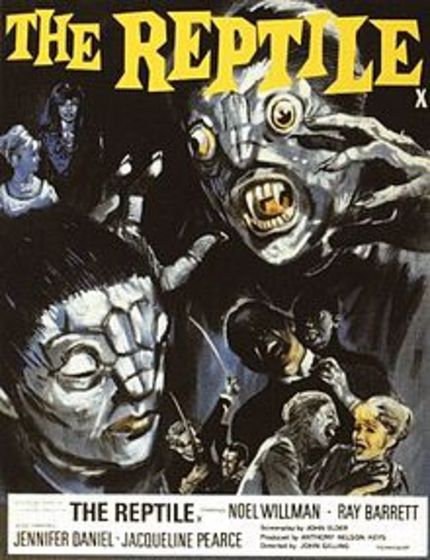Bradford 2012 review: THE REPTILE (1966)

Despite the threadbare effects, though, and an ending that staggers across the finish line, The Reptile is an oddly restrained, moving, even genuinely eerie little film from the cult production house. No gore, scream queens, heaving cleavage or flirtation with softcore fanservice (okay, don't all leave at once) - instead we get actual natural-sounding dialogue, character development and horror that stems from something convincingly inhuman. This is still camp, still cult, but you're laughing with the cast, not at them, and the darker material elicits an emotional response as much as a stifled 'Ewww!'.
It starts, as so many of the classics do, with an unfortunate getting it in the neck from the monster of the title. The villagers cluck in sympathy and wonder who'll be next to go down foaming at the mouth while turning an unhealthy shade of green. But it turns out this victim has a brother. Harry Spalding (Ray Barrett), an officer with Her Majesty's finest, is newly married and looking to settle down in a picturesque country cottage just like the one his brother has recently left vacant.
Harry is determined not to be forced out, no matter how many dire pronouncements the locals mutter about his meeting an untimely end. He soon discovers that Doctor Franklyn (Noel Willman), the anxious gentleman in the big house across the heath, seems to be a little too closely connected with his brother's death . Not to mention there's a lot more to the good Doctor's young daughter Anna and her silent Indian manservant than meets the eye. And naturally, in trying to unravel the whole sordid affair, Harry finds out he's put himself, his wife Valerie (Jennifer Daniel) and their few friends in the village in mortal danger.
The Reptile comes with the same air of faux-decay common to so many Hammer productions - mouldering grandeur on a less than opulent budget (it was shot back-to-back with Plague of the Zombies to save on costs). Appropriating Eastern mysticism for populist consumption - cultists, dark rituals, white slavers - seems more of a joke now than ever, evoking Austin Powers even before Indy in the Temple of Doom. The effects are as transparent as it gets, and even the monster makeup doesn't hold up particularly well - the kills are a riot of tacky green face paint, agonised gurning and frantically blowing bubbles.
But while the work Gilling and his crew put in doesn't quite stand the test of time, The Reptile's story is a much more lasting thing, one that becomes significantly more than the typical Hammer route map in the telling. Harry is immediately likeable, with Ray Barrett giving him just enough depth of feeling his stiff upper lip never becomes annoying. Valerie is vulnerable, yes, but in a much more human way than some of Hammer's women. She gets frightened, but not so easily as to break wine glasses at the first sight of blood.
And The Reptile even manages to earn some level of empathy for its villains. None of the people behind the attacks are painted as wholly without merit - they might be hurting people who don't deserve it, but their grudges are easily understood. A pivotal dinner party scene is still unintentionally comical, turning on the same penny dreadful stereotypes as so many other Hammer films, but at the same time it's actively disturbing, the kind of unnerving psychodrama Dracula rarely went anywhere near. The hysterics at the end feel earned, not merely cause for muffled laughter.
The Reptile is almost a legitimately great film, but too much of this simply doesn't last. Despite the rising tension there's disappointingly little real peril, and most of the plot threads end up written off fairly abruptly. The ending, too, is a tiny stone dropped into a very small puddle. The secret lair is a tissue-thin nonsense, and the final confrontation gets wrapped up in vastly anticlimactic fashion, with all the earlier foreshadowing brought up short in maybe ten seconds flat. For all that Hammer hit the target here, there's plenty to remind you why people mock them.
Still, Gilling's direction is solid enough, the plotting shows actual care and attention to detail beyond simply psyching up the crowd, and the cast put real energy and humanity into characters significantly more complex than Hammer's stock in trade of dashing moral exemplars versus slathering, red-eyed villainy. The Reptile is still cut from a very similar template, but though time hasn't been too kind to the film this is a memorable little piece of British genre cinema all the same - not particularly frightening, but haunting and not a little sad for all the hokey pantomime melodrama. Consider it recommended.
(The Reptile was screened at the 18th Bradford International Film Festival, held in the UK National Media Museum in Bradford from 19th-29th April 2012.)

Do you feel this content is inappropriate or infringes upon your rights? Click here to report it, or see our DMCA policy.






